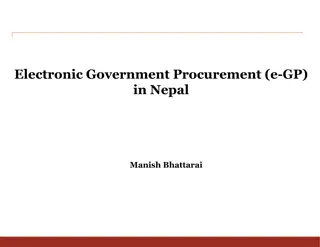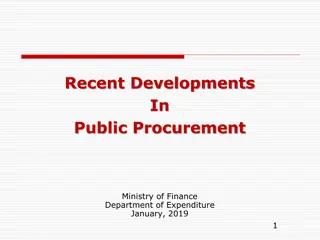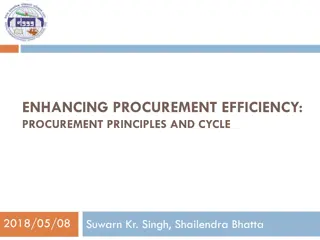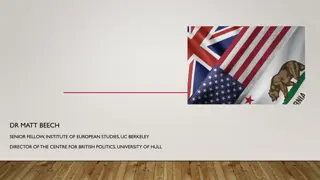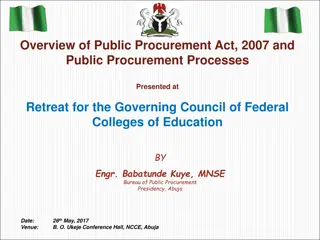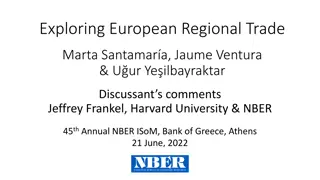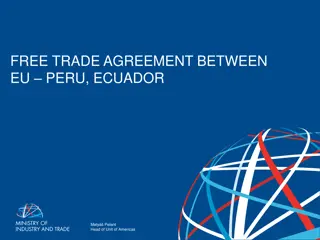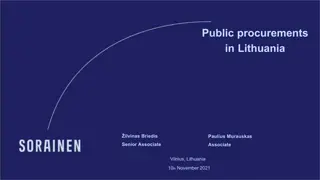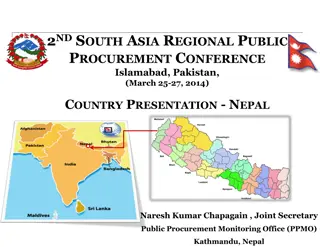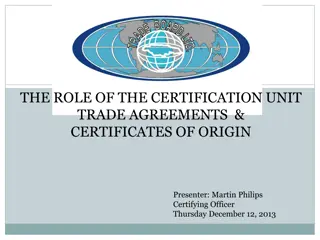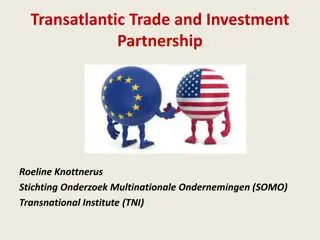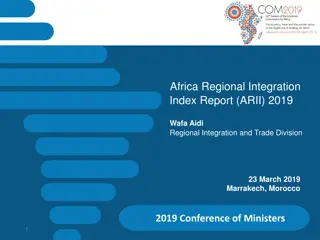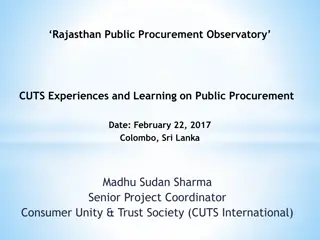Exclusion of Public Procurement from Regional Trade Agreements
Regional free trade agreements often exclude public procurement to prevent foreign investors from participating and potentially leading to disputes. Various agreements, such as RCEP, EU-UK Trade Agreement, USMCA, and African Continental Free Trade Area Agreement, specifically exclude government procurement measures. This exclusion aims to safeguard government purchasing for non-commercial purposes and avoid potential challenges under investment treaties.
Download Presentation

Please find below an Image/Link to download the presentation.
The content on the website is provided AS IS for your information and personal use only. It may not be sold, licensed, or shared on other websites without obtaining consent from the author.If you encounter any issues during the download, it is possible that the publisher has removed the file from their server.
You are allowed to download the files provided on this website for personal or commercial use, subject to the condition that they are used lawfully. All files are the property of their respective owners.
The content on the website is provided AS IS for your information and personal use only. It may not be sold, licensed, or shared on other websites without obtaining consent from the author.
E N D
Presentation Transcript
WHY IS PUBLIC PROCUREMENT OFTEN EXCLUDED FROM REGIONAL FREE TRADE AGREEMENTS? Dr Dominic Dagbanja Senior Lecturer in Law The University of Western Australia dominic.dagbanja@uwa.edu.au
TAKE HOME POINTS Protectionism? Public procurement is excluded from FTAs to exclude foreign investors and traders from participating in the procurement market. In the absence of specific exclusions of public procurement, investment treaties would most likely apply to public procurement measures which may lead o the foreign investors instituting investor-state dispute settlement claims against states. Dr Dominic Dagbanja - 2022 UNCITRAL Day in Africa 3/11/2022 2
THE EXCLUSION OF PUBLIC PROCREMENT FROM REGIONAL TRADE AGREEMENTS Regional Comprehensive Economic Partnership Agreement, signed 15 November 2020, entered into force 1 January 2022. [Association of South-East Asian Nations]. Article 10.2(2): The investment chapter shall not apply to government procurement 12.3(2). The electronic chapter shall not apply to government procurement. Trade and Cooperation Agreement between the European Union and the European Atomic Energy Community and the United Kingdom of Great Britain and Northern Ireland, signed 30 December 2020, entered into force 1 May 2021 Article Servin 1.1(6). This Title [services and investment] does not apply to any measure of a Party with respect to public procurement of a good or service purchased for governmental purposes, and not with a view to commercial resale or with a view to use in the supply of a good or service for commercial sale, whether or not that procurement is covered procurement . US-Mexico-Canada Agreement (USMCA), entered into force on 1 July 2020 Article 14.12.5 (a): 5. Article 14.4 (National Treatment), Article 14.5 (Most-Favored-Nation Treatment), and Article 14.11 (Senior Management and Boards of Directors) do not apply to government procurement Dr Dominic Dagbanja - 2022 UNCITRAL Day in Africa 3/11/2022 3
THE EXCLUSION OF PUBLIC PROCREMENT FROM REGIONAL TRADE AGREEMENTS Agreement Establishing the African Continental Free Trade Area, adopted 21 March 2018, entered into force 30 May 2019. Article 2(4) (trade in Services) Procurement by governmental agencies purchased for governmental purposes and not with a view to commercial re-sale are excluded from the scope of this Protocol. Comprehensive Economic and Trade Agreement (CETA) between Canada and the European Union, signed 30 October 2016. Article 8.15.5(a): The market access provision of Article 8.4, the non-discrimination rules of the most-favoured- nation in Article 8.6, national treatment in Article 8.7 and non-interference with the appointment of senior management or board of directors provisions in Article 8.8 do not apply to procurement by a Party of a good or service purchased for governmental purposes and not with a view to commercial resale or with a view to use in the supply of a good or service for commercial sale, whether or not that procurement is covered procurement within the meaning of Article 19.2 Dr Dominic Dagbanja - 2022 UNCITRAL Day in Africa 3/11/2022 4
EXPLAINING THE EXCLUSION OF PUBLIC PROCUREMENT FROM REGIONAL FREE TRADE AGREEMENTS Procurement as Investment and Investor-State Arbitration According to Article 1(6) of the Energy Charter Treaty, investment means every kind of asset, owned or controlled directly or indirectly by an Investor . Expenditures incurred by a successful foreign tenderer may qualify as an investment. This may entitle a foreign investors to seek the protection of investment treaties. For example discrimination against a foreign tenderers, could be in breach of the fair and equitable treatment standard or the standard against arbitrary or discriminatory measures (Marc Bungenberg and Fabian Blandfort, 2020). Dr Dominic Dagbanja - 2022 UNCITRAL Day in Africa 3/11/2022 5
EXPLAINING THE EXCLUSION OF PUBLIC PROCUREMENT FROM REGIONAL FREE TRADE AGREEMENTS The Methods of Procurement, Investment Treaties and Investor-State Arbitration National Competitive Tendering: Where national competitive tendering is employed, only national prospective bidders may be invited to participate in the procurement process National competitive tendering by its very nature is exclusionary in the sense that it limits participation in procurement to nationals. This may be justified in the interest of national development and other national priorities. However, as explained below, national competitive tendering when required purely under national procurement regulation can conflict with national treatment requirement under IIAs (Dagbanja, 2020: 71). In restricted tendering, only those economic operators invited to submit a tender after the contracting authority has assessed the information provided by the economic operators may make a submission ... Where restricted tendering is used, invitation for tenders must be made to prospective tenderers who can provide the goods, works or services (Dominic Dagbanja, The Intersection of Public procurement Law and Policy, and International Investment Law (2020) 27(2) Transnational Corporations 65: 72). Dr Dominic Dagbanja - 2022 UNCITRAL Day in Africa 3/11/2022 6
EXPLAINING THE EXCLUSION OF PUBLIC PROCUREMENT FROM REGIONAL FREE TRADE AGREEMENTS The Methods of Procurement, Investment Treaties and Investor-State Arbitration In Bosca v Lithuania, the tribunal held that the decision of a Lithuanian State entity to not award a procurement contract to a foreign investor was made in bad faith and contrary to the investors legitimate expectation, which constituted a breach of Lithuania s obligation to accord the investor just and equitable treatment under the Lithuania Italy investment treaty. The effect of this decision is that a State party to an investment treaty which does not exempt procurement measures from its scope of application has an obligation to open its procurement proceedings for participation by covered foreign investors. A State s failure to open such procurement proceedings and to award a procurement contract to a covered foreign investor may well be in breach of the applicable investment treaty (Dagbanja, 2020: 88) Dr Dominic Dagbanja - 2022 UNCITRAL Day in Africa 3/11/2022 7
EXPLAINING THE EXCLUSION OF PUBLIC PROCUREMENT FROM REGIONAL FREE TRADE AGREEMENTS Preferential Procurement, Investment Treaties and Investor-State Arbitration Section 217(2) of the Constitution of the Republic of South Africa grants organs of the State and other institutions identified in national legislation power relating to implementing a procurement policy providing for (a) categories of preference in the allocation of contracts; and (b) the protection or advancement of persons, or categories of persons, disadvantaged by unfair discrimination. Broad-Based Socioeconomic Empowerment Charter for the Mining and Minerals Industry 2018 required inclusive procurement. In the case of the procurement of mining goods,69 the Mining Charter states the criteria for inclusive procurement as follows: A minimum of 70% of total mining goods procurement spend (excluding non-discretionary expenditure) must be on South African manufactured goods. The 70% shall be allocated as follows: 21% to be spent on South African manufactured goods produced by a Historically Disadvantaged Persons owned and controlled company; 5% to be spent on South African manufactured goods produced by a women or youth owned and controlled company; and 44% to be spent on South African manufactured goods produced by a BEE compliant company. These requirements stand to conflict with national treatment and prohibition against performance requirements in investment treaties. Dr Dominic Dagbanja - 2022 UNCITRAL Day in Africa 3/11/2022 8
CONCLUSION THANK YOU Dr Dominic Dagbanja - 2022 UNCITRAL Day in Africa 3/11/2022 9
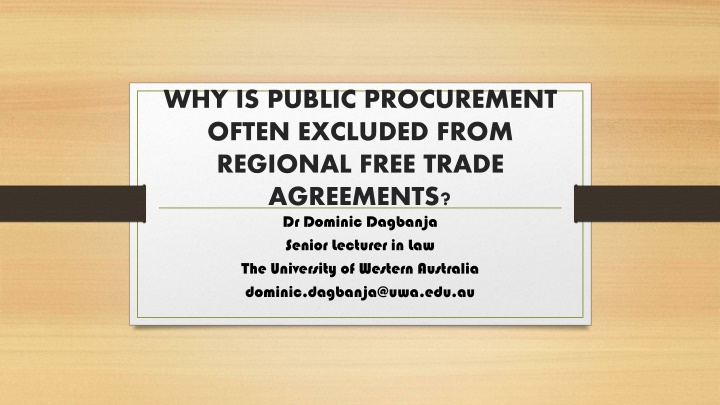




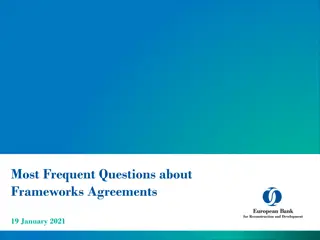
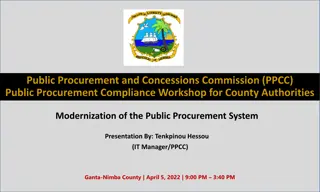
![Comprehensive Overview of Corruption Watch Submission on Public Procurement Bill [B18B-2023]](/thumb/138344/comprehensive-overview-of-corruption-watch-submission-on-public-procurement-bill-b18b-2023.jpg)
